Soul City record store owner Dave Godin coined the term: ‘Northern Soul’ in his 1970 ‘Blues and Soul’ magazine. The impresario was referring to obscure American soul music of the mid-sixties that curried favor with clubbing fans in the North and Midlands areas of England.. This colossal underground movement, which initially borrowed fashion ideas from the Mods, first came to roost in, among other venues, the Wigan Casino, Catacombs in Wolverhampton, Manchester’s Twisted Wheel and Blackpool Mecca in the late 1960s and 1970s. Indicative of its bi-cultural leanings, cloth patches from the era often featured the fist which exemplified black power in the U.S. Stylized, Intricate dance steps also became part and parcel of the scene. Many popular dance clubs have either closed down or changed hands, yet this energetic movement continues to flourish across major cities in the UK and the United States, albeit not without the dedication of local heroes, and that is what this article is about… The vaults of Vee-Jay, one of many independent labels that functioned in the South Loop of Chicago, remains infamous for its signing of the Four Seasons, Gene ‘Duke of Earl’ Chandler, ‘Shoop Shoop’ singer Betty Everett, Jimmy Reed and gravel-voiced guitarist John Lee Hooker. If only these walls could speak--In 1955, Little Richard recorded ‘Tutti Frutti’ there. Vee-Jay wisely signed The Beatles, who, at the time, were surprisingly overlooked. Vee-Jay was also one of the first black-owned record labels co-run by a female: The initials stand for the spousal team of Vivian Carter and James C. Bracken. Vee-Jay may be defunct, but the original building still stands. The label is honoured visually by the owners of the chic storefront business, Overflow Coffee. The owners have honored Vee-Jay and the historic Brunswick building’s legacy—a smattering of related album covers featuring portrait shots of Vee-Jay artists dominate an adjacent wall. The eye candy is as striking to the senses as the layered harmonies and infectious beats emanating from the sound system At centre stage on a brisk Sunday afternoon is vivacious Debbie Benjamin-Koller. When not navigating a swerving Vespa and taking in national vistas with her scooter-obsessed buddies, she actively promotes and spins Northern soul records. I’m seeing red! Koller-Benjamin is smartly decked out in bright plaid. Her sonic accomplice, svelte Ricki Friedmann, sports a tailored jacket, skirt and short boots. I mention their garb because, similarly to ‘the mods,’ fashionable clothing matters in this business. Both women freely engage with the coffee shop customers. Their personalities light up the spacious room. Friends drop in, sip signature drinks and converse as the turntable needle drops down on another compelling B-side. Benjamin-Koller and ‘Rockin’ Ricki’ stare down a stack of up-tempo, horn-dominated singles, many made popular by Chicago area artists, some of whom are still living; some not. They’ve dedicated a portion of the afternoon to these artists. Periodically, they’ll pick up the receiver of an old-school, red telephone. Is this a prop? When I inquire about its purpose, Benjamin-Koller explains: “The red phone is a headphone that I cue records with…” As an observer, I find that this colourful phone adds to the vintage atmosphere, that it rekindles the golden age of music the two women eagerly promote, a time well before cell phones, in which actual, animated conversations were the norm. Benjamin-Koller, a vital member of All Mod Chicago, doubles as a devoted ally of the fourteen--year strong Windy City Soul Club, headed by founding member Aret Sakal. Benjamin-Koller does her fair share, as well, by tirelessly promoting all-things Northern Soul through her own expertise as a DJ., and as a poster of timely social media announcements. Deeply rooted in the soul scene, she makes it a point to acknowledge contributions made by the movement’s cultural icons. Is there an artist in the music community-at-large that has been overlooked? Benjamin-Koller will set the record straight and give credit where credit is due. If you want to know the whereabouts and the featured act or DJs of the next meet up, she’s your gateway. Sakal’s experience in the field is second to none. He kindly put his own spin on these replies: PB: The Windy City Soul Club celebrated its fourteenth anniversary recently. Congratulations. What is the focus of the WCSC? And please describe your fans. ARET SAKAL: Our focus has always been about records! Trying to find the most obscure/rare record that’s going to set the party off; trying to find records that nobody else is playing. Not trying to be superstar DJs or influencers or any of that bullshit. The real superstars are the one’s singing on the records, the songwriters, the producers, the arrangers; the guy who designed the label art—not us. Our fanbase, I would say, is 10% scenesters and 90% general public. Mostly guys and gals in their 20’s to early 30’s from the local area. PB: As a DJ, do you plan your set lists? Take requests? How do you sequence your records? AS: I’m more of a soul collector turned DJ. We never plan a set list. You kind of have to read the room to set the mood. The night of the event, I’ll go through the record shelves and be like, “Oh, yeah, that’s getting played…oooh! This one, too.”. PB: Among other things, you have to narrow down the wealth of material; no small task. What’s the plan? What kind of equipment do you use? AS: We usually play slower and mid-tempo early on and the juicy stuff during prime time. 90% of the fans have no concept of Northern Soul so they are out just to hear good music and have a good time. We use two Technics 1200 mk2 turntables. Allen and Heath Xone:42 mixer. PB: Let’s cut to the chase! Who’s out there dancing? Do you see dance moves from back-in-the day or largely freestyle dancing? AS: As far as the dancing goes, the scenesters here dance the way they would at traditional Northern Soul events in the UK. And the local regulars, who are not aware of Northern soul, dance the way they want to. PB: What kind of personality works best onstage? AS: I always say the same thing: “don’t be the boring guy onstage, just playing records and not paying attention to the crowd.” You’ve got to sing along, clap, move and groove; make eye contact, smile and wave at people. Make it a performance! Make them want to come back! PB: How would you describe the dynamics between the US and the UK in regards to this movement? Who deserves more credit? AS: The British for sure! DJs/collectors/dealers from Northern England, to be exact, built the foundation of the scene by coming to America during the late 1960s and early 1970s, bringing home rare and obscure soul 45s that Americans were pretty much done with. Took them home and created this awesome underground scene! Like, they were creating the blueprint for raves! PB: Are soul clubs spread out across the United States? Mostly in major cities? AS: Here are some key Soul Clubs/Soul Nights in the U.S. that keep the torch burning: Emerald City Soul Club in Seattle, WA., Hipshaker in Minneapolis, MN., Alamo City Soul Club in San Antonio, TX., Motor City Soul Club in Detroit, MI., Alcatraz Soul Club in San Francisco, CA., just to name a few. (Benjamin-Koller: ‘Mexico City even has a growing Northern Scene.’) PB: My understanding is that some of the most popular recordings are a hybrid of Gospel, blues, rhythm and blues and soul. AS: Yes, definitely. All of those ingredients are in the mix and you can hear it! PB: Can you name a few favorite groups? What qualities make them stand out? AS: The Ivories, ‘Please Stay,’ (Despenza), The Demures, ‘Raining Teardrops’ (Brunswick). The best way to explain their qualities is to play them for yourself. Check YouTube if you’re unfamiliar. If the hairs on your neck and arms don’t stand up and you’re not up dancing, doing kicks and spins, then something is wrong. PB: Is it important for future generations to listen to this music? AS: I’m not really sure if it’s important. Let people listen to what they want. Just because WE think this is great music doesn’t mean everyone does or has to. Just don’t use this music or the scene for social media clout chasing purposes. PB: Is there anything else you’d like to add to give us a greater understanding of this unique music and club scene? AS Yes! Keep supporting your local Soul Club! At a near-north pub, further away from the city centre, A.J. Hudson’s Public House, where British and American footballers commonly interact, DJ Gethro Jones and his partner Janet O’Hare confer about which singles to spin on their own set of gleaming twin turntables. Jones, a Wolverhampton native, saw first-hand how the Northern Soul scene blossomed over the years. In fact, he was in the very room where much of it happened. In his 2016 memoir, ‘They Danced All Night’ about the ‘Wolves’ soul scene and the filled-to--capacity Casino, which awarded him the opportunity to become an expressive, acrobatic dancer, Jones speaks from the heart. Live, he displays a couple of choice moves between cuts. As purveyors of their own British Northern Soul Club, Jones and O’Hare spin a spectrum of singles. As such, original Vee-Jay artist, Frankie Valli’s distinctive vocals resonate above a throbbing bass line from 1967’s ‘Beggin.’ The Bob Gaudio scribed song has been revived by, among others, Madcon in 2008 and by Maneskin this year. The beauty of these Northern Soul selects is that through alternative iterations, many have cultivated new audiences. Another classic, ‘Tighten Up’ by Texas band Archie Bell and the Drells echoes across the tavern’s dimly-lit back room. It’s an infectious and one-off arrangement. The bassist kicks in with gusto, after Bell preempts his solo with a casual introduction. It goes without saying that a cross-cultural movement like this might cease to exist without the support of committed community members, in the UK. and the US. Happily, the movement continues to flourish in the US. and across the pond, because folks, the likes of Benjamin--Koller, Rockin’ Ricki, Jones, O’Hare and Sakal remain on the lookout for unsung singles begging to be spun. Lesson learned: A two-buck 45 lodged in the back of a discount rack should never be overlooked. And behind every grooved vinyl track is, of course, a backstory; a dream that a once-ambitious act longed to achieve. But the biggest takeaway? Because these local music professionals stand beside those dreams, many rejuvenating songs remain on our radar. Being a recent ‘soulie,’ I knew, I needed to know more. I was fortunate that Debbie Benjamin-Koller agreed to respond to questions about the exciting Northern Soul scene as well as about her role as a cultural educator, technician and super fan. PB: What distinguishes the WCSC scene from other clubs promoting similar interests? DEBBIE BENJAMIN-KOLLER: I think WCSC is a very unique soul night because the crowds are so different. It seems more underground and has more of an organic feel because the crowd comes from all walks of life. From what I have seen in the UK, the people who come are very knowledgeable about the Northern Soul culture, of the clothing, dance style, music… Our crowd definitely has those people who love and live the subculture. You will notice them on the dance floor with the Northern steps they use and the way they dress in vintage 60’s mod looks: Fred Perry, Ben Sherman. You may even see vintage Vespas and Lambrettas outside the venue. But there is also a loyal following of people that I have not seen anywhere else. They are young people and people who grew up going to WCSC and keep coming. There is something about the music that speaks to generations in Chicago. People know they will have a great time, and it’s the best dance party in the city and they keep coming. There are no people sitting at tables; it is a full-on dance floor, so you either dance, rest or make friends. The beat is electric. Aret, Jason, Jordan and Nick all have a wealth of knowledge of Rare American Soul or ‘Northern’ music, and have collected a selection with the energy that makes people want to dance. Their specialty is Chicago Soul from labels that created a lot of this music. You won’t slow dance at a Windy City Soul Club but they will take you through the artists’ emotional journey of heartache, love and happiness. PB: Was your deep dive into the scene motivated by early musical experiences? DBK: I have loved soul music since I was a mod girl in the 1980s but only knew about Motown and more popular groups. I got pulled back into the Mod/Scooter scene and then into the Rare Soul Scene around 2010 by my old 80’s club mate Jordan Cinco and WCSC DJ Jason Berry. When I started going to WCSC I was hooked. Every song seemed so familiar though I’d never heard it before. Every song kept me on the floor; that is a common experience at WCSC and why it has a loyal underground following who will follow them anywhere with sold out crowds. You will see typical Northern Soul dance moves from regulars who are in the know of the UK scene and know the Northern Soul style of dance, but then you see a variety of moves brought on by emotion coming out of the passion of the music. Even the DJs get swept away and seem to know every little nuance to a song, acting it out or moving along. The combination of the DJs, the records and the crowd are a perfect storm for an electric party, but the real heroes are the overlooked and unsung artists. The WCSC DJs are very aware of the plight of many artists who recorded this great music only for most to end up in obscurity. They pay their respects and are pretty humble when it comes to who is the star on the stage. It’s heartbreaking and wonderful at the same time. After meeting Ruby Andrews, Barbara Mercer, Jackie Ross and other stars, I always tell them how loved they are in the United States., the UK and around the world. It brings them joy to know their art was not lost and still lives on the dance floors of Chicago and around the world. https://www.emptybottle.com/blog/tag/Windy+City+Soul+Club PB: Exactly. So, given the quality of the music, why weren’t more of these songs’ hits? DBK: When people here first started listening to rare Northern Soul it was not uncommon to hear them say, ‘Why have I never heard these songs before?” Everyone knows Motown, but why did these songs never make it through to the mainstream? I don’t think there is one easy reason, but I am glad it wasn’t lost, when the US market didn’t pick up on it. Thanks to the DJs and clubs in the North of England for reminding us of our own history and digging for and highlighting forgotten records and a beat that fills a dance floor. PB: What characteristics are commonly found in the Northern Soul genre? DBK: Northern Soul tends to have an up-tempo 4:4 beat around 100 beats per minute. Unlike some Soul nights in Chicago where they play anything from funk to disco and novelty songs, WCSC and other DJs that collect similar music look for that Northern tempo and beat as well as elements of great call and response, harmonies, playfulness and variety of instrumental hooks with horns, bells, strings… This music would be so hard to produce today with all the orchestral and vocal arrangements which is very appealing to people because it is so unique. Chicago labels like Chess, Checker, Okeh, Vee-Jay and Brunswick were great at this kind of orchestration. I particularly love local favorites: Gene Chandler, the Artistics, Jerry and Billy Butler, Jackie Ross, Betty Everett, The Dells, and have a love for Detroit’s Edwin Starr, Barbara Mercer and the Golden World Label. PB: How did you acquire your DJ skills? DBK: Compared to WCSC, I am fairly new. I was an 80’s mod girl, but really got into the rare Northern records in around 2010. When I was a mod girl I made a good study of the British subculture in regards to fashion, scooters and music, and I still take that approach. I listen and learn from other DJ’s and then dive into the research. Being a Chicagoan there is a lot of access to records, and in the beginning it was a lot of trial and error. But I knew the sound and labels and artists and sometimes you are just looking for something you’ve never seen before. Pre-pandemic I was hitting record stores and dusty crate digs with my little portable player using the knowledge of labels, artists and knowing the beat that speaks to me; stacking records to listen quickly for that hidden treasure. But when the pandemic hit, we were all trapped at home and the music world opened up when people started live-streaming. The DJs and soulies we only read about were now online, talking to us in the comments and playing amazing records. I started following, listening and then connecting with people in the North of the UK and all over who had the same interests. I learned more about the music and what I liked, and not being able to dig locally was hard, so I started finding records online. I tend to collect rare Chicago-made music and love the underplayed, though people want to hear things they know so I make sure I get enough familiar favourites that can fill the floor. I think the UK definitely inspired me and others, the different subcultures and a deeper love of soul. It highlighted to me what was in my own backyard. I like to DJ from the historical perspective and tend to collect original vinyl. I don’t mind the crackle and pop in a record-that makes it more authentic and makes me feel like I own a piece of history. I am grateful that I was tuned into how great this music is, considering you would never know what happened in Chicago if you didn’t seek it out. It’s almost as if the City decided to forget its own history and a section of town and what happened there. In the 1960s and 1970s a 12-block stretch of South Michigan Avenue was called Record Row because it was churning out soul music with record labels and distribution centres sending records all over the country. At the time Chicago was a hub for soul music, but today the only reminders are the Chess Records museum at 2120 S Michigan and The old Vee-Jay and Brunswick headquarters which is now a black-owned Overflow Coffee Shop at 1449 S Michigan, honouring its history with a gallery and events with DJs and small performances. Ricki Friedman (DJ Rockin’ Ricki) and I have started doing a Series called ‘Sunday Spins’ where we try to bring back the music to Record Row. PB: Part of your journey involves reaching out to like-minded individuals through social media. DBK: In 2017, Jordan Cinco and I had started a FB group called All Mod Chicago. We wanted to make sure people who had similar interests knew what was going on and wanted a clearing house of events for locals and a place for out-of-town4 people to connect with locals when they come to town. Little did we know we would be promoting our city and culture as well as making great friends across the world. Before the [andemic, we were sponsoring DJ events and putting together groups of great DJs at clubs and festivals. Lockdown brought the world closer and had us live-streaming from my back yard and posting on other groups. It is an interesting time to be a woman DJ. In the past three years being a woman has opened up doors for me and others. Maybe, initially, women have drawn attention because a DJ has been more of a man’s game. I think more women are getting into the game. It seems like online listeners are interested in hearing our perspective and interpretation through what we play. I think people know my perspective has more of a 60’s ‘golden oldies’ feel and that I will always throw Chicago records in a set and call them out on a live stream. I love that people really know Chicago and have a great appreciation of the music and artists that came out of it, so I love to have a moment in a Livestream where I showcase some really great Chicago soul. In the Summer of 2020, during the height of the pandemic and lockdowns, All Mod Chicago did live streams in my yard. I had bought a DJ rig prior to the pandemic and we would host parties and events. We were getting cabin fever and thought it would be fun and safe to set up outside and livestream. So, we asked our DJ friends to come spin. We even had one of our friends ride up on his Lambretta. https://www.instagram.com/p/CFcjuE8FYMh/?utm_source=ig_web_copy_link PB: By venturing out during a remarkably unpredictable period of time, did you experience missteps? Unexpected successes? DBK: On one of those Livestreams I had made the faux pas of sharing the Live stream without asking on a Facebook Northern Page, called ‘The Soul Twins Mopsey and Foxy.’ I realize now this was not the most respectful thing to do. Don ‘Mopsey’ Morris sent me a message and was so gracious, after he gave me a little talking to. I was kind of embarrassed and told him I was sorry, and to my surprise he told me that he liked what we were doing and asked me If I wanted to get some DJs together to do a Sunday live stream on the page. I messaged my DJ friend Cher Gavel Gingras from Toronto Northern Soul Club and Slow Fizz, who got in touch with Fiona McKelvey from Crystal City Mod Club in Waterford, Ireland and we had our first show called ‘Soul Sister Sundays’. We are going on our second year of doing Soul Sister Sundays and have included many other women DJs like Cara Stefanides (Detroit), Sally Shardlow (U.K.), Rockin’ Ricki (Chicago), Jemima Higgans (Blackpool), Linda Doran (Ireland) and Mel Glover (UK.). It has been a great time getting to know these women online and then meeting some of them in person recently at an event in Detroit. We all have been doing different FB groups and on Mix Cloud and try to enter the chats when we can and cheer each other on. As much as I really hated the pandemic, I am grateful for how the Northern Soul Scene has become a much smaller world. All Mod Chicago has become a place to showcase our city and all the amazing things that are happening here. Post pandemic All Mod Chicago has been hosting ‘Amplified Chicago’ where our Resident DJ’s Rockin’ Ricki, Jordan Cinco and myself invite other DJs to spin at the Golden Dagger on North Halsted street right down the street from where some of Chicago’s famous Blues clubs stood. Our local Vintage Scooter Club, Mayday SC, has also included our events in their Scooter Rally and Vespa Club of America, Chicago Chapters meet ups. PB: I’m fascinated by the bi-cultural aspect of your experience. How do you see the difference between what happens in the UK and what happens in the United States on a given night? DBK: I think the difference of a UK soul night and a Chicago night is that a soul night in the United States might be more underground, whereas Northern Soul in the UK seems to be more built into the fabric of the culture of the country. People in the UK seem to have grown up with Northern Soul; going to certain clubs from their youth and following the culture. While there are people in the know at a WCSC night, a lot of people are there for the fun and the party on the dance floor. Though we may be coming from different perspectives, we dance on that floor; what brings us together is the music and the community on the dance floor. There are some big soul weekenders: Emerald City Soul Club hosts a West Coast weekender and on the East Coast and Midwest there is the Keystone Soul Weekender bringing together tons of United States, soul DJs and enthusiasts. PB: Thank you, Debbie. See you on the dance floor. The photograph of Aret Sakal was taken by Chema Skadal and of Debbie Benjamin-Koller by Christopher Torem.
Band Links:-
https://www.facebook.com/keystonesoulweekenderhttps://www.facebook.com/groups/emeraldcitysoulclub
https://www.facebook.com/groups/343992616065078
Play in YouTube:-
Picture Gallery:-
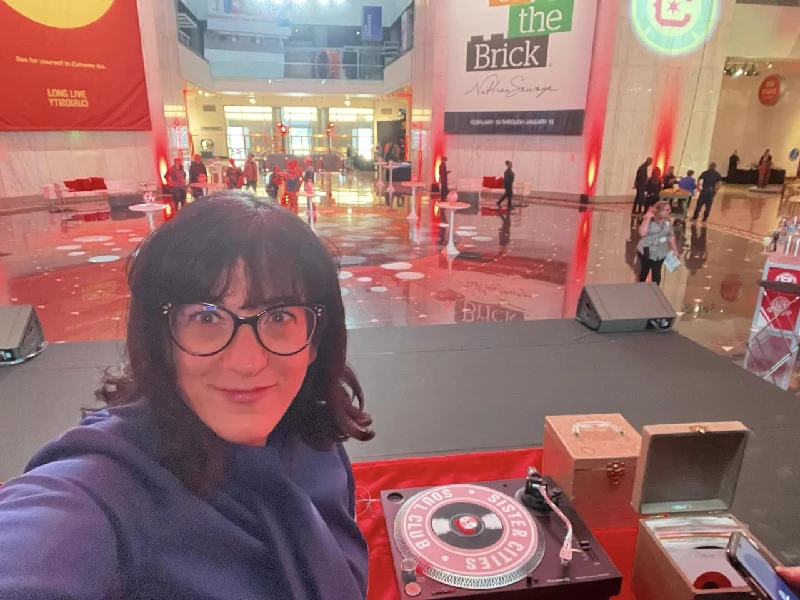
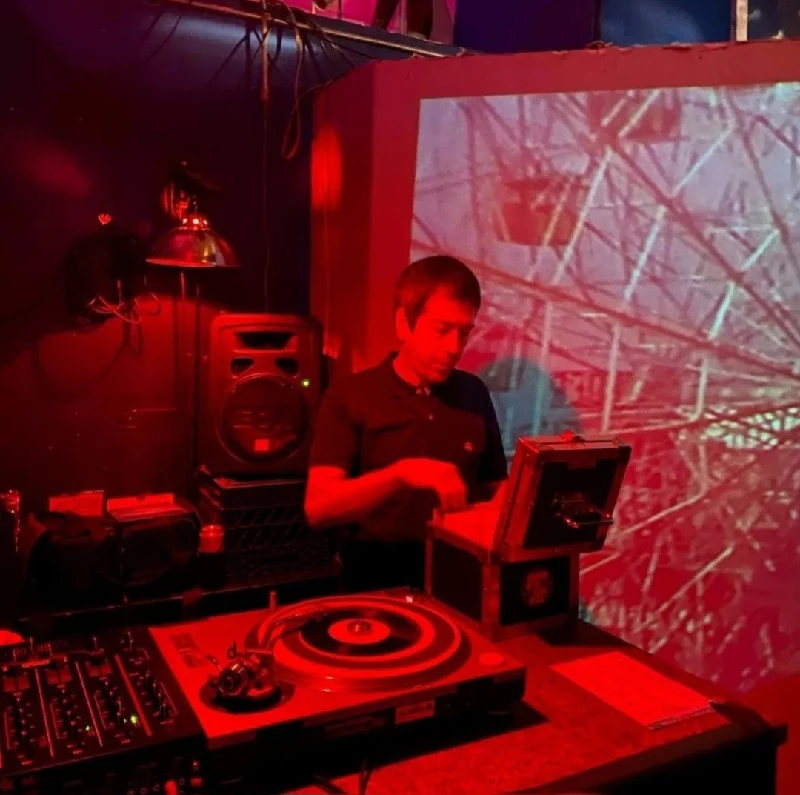
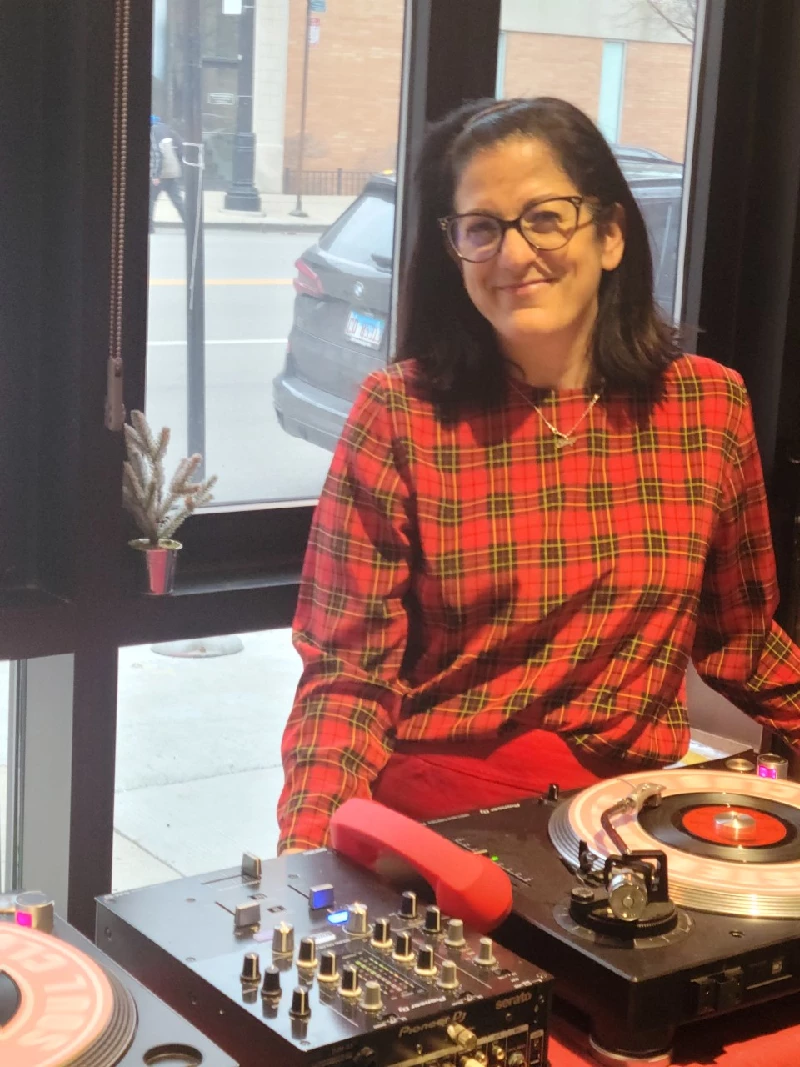
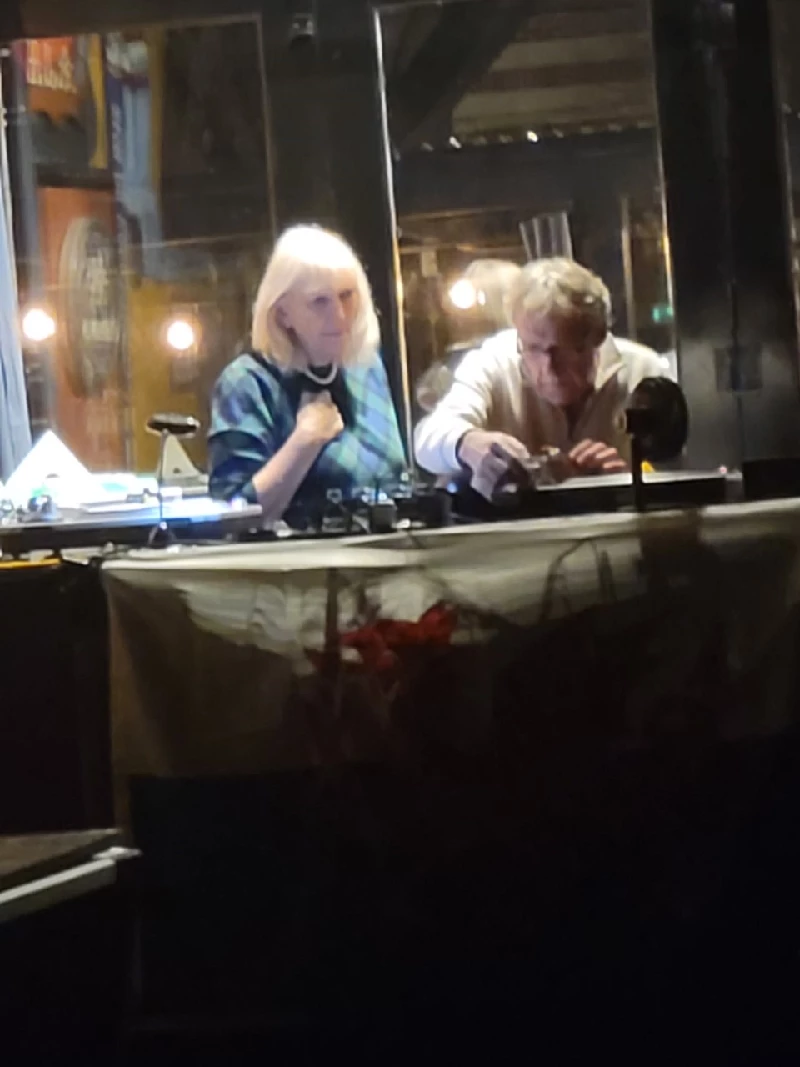
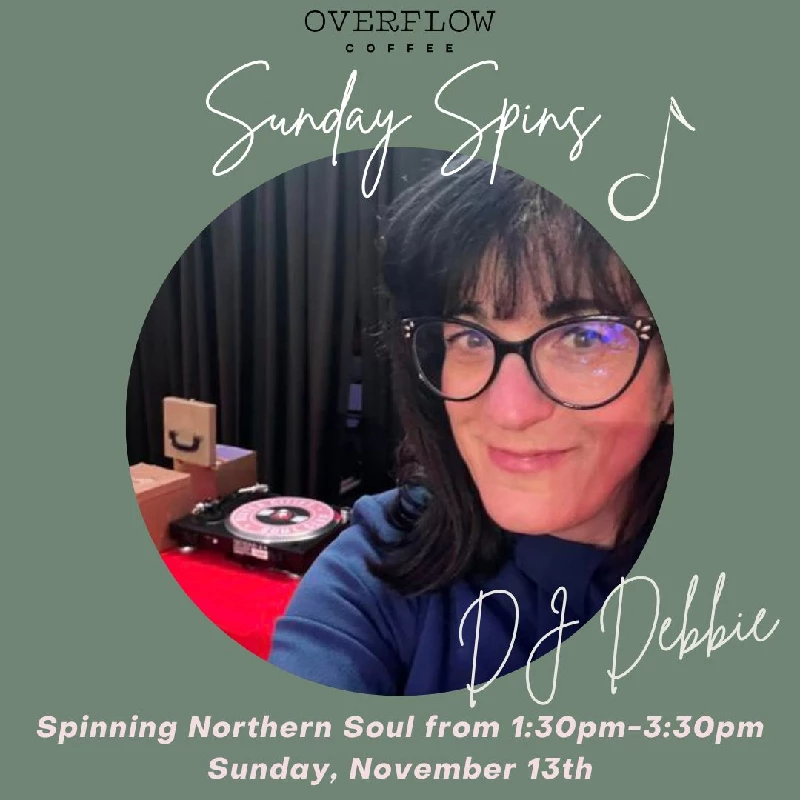
intro
Chicago DJ Debbie Benjamin Koller and Chicago DJ/Windy City Soul Club founder, Aret Sakal share insights regarding the Northern Soul phenomenon in an exclusive interview.
most viewed articles
current edition
Carl Ewens - David Bowie 1964 to 1982 On Track: Every Album, Every SongArmory Show - Interview with Richard Jobson
Colin Blunstone - Thalia Hall, Chicago, 16/7/2025
John McKay - Interview
Visor Fest - Valencia, Spain, 26/9/2025...27/9/2025
Bathers - Photoscapes 1
Billie Eilish - O2 Arena, London, 10/7/2025
Loft - Interview
Robert Forster - Interview
Sir Tim Rice - Interview
previous editions
Heavenly - P.U.N.K. Girl EPManic Street Preachers - (Gig of a Lifetime) Millennium Stadium, Cardiff, December 1999
Beautiful South - Ten Songs That Made Me Love...
Oasis - Oasis, Earl's Court, London, 1995
Prolapse - Interview
Coldplay - Wembley Arena. London, 16/8/2022
Boomtown Rats - Ten Songs That Made Me Love....
Peter Perrett - In Dreams Begin Responsibilities Interview Part One
Trudie Myerscough-Harris - Interview
Pixies - Ten Songs That Made Me Love...
most viewed reviews
current edition
Sick Man of Europe - The Sick Man of EuropeDavey Woodward - Mumbo in the Jumbo
Amy Macdonald - Is This What You've Been Waiting For?
Lucy Spraggan - Other Sides of the Moon
Phew, Erika Kobayashi,, Dieter Moebius - Radium Girls
Suzanne Vega - Flying With Angels
Bush - I Beat Loneliness
Blueboy - 2
Alice Cooper - The Revenge of Alice Cooper
Cynthia Erivo - I Forgive You
Pennyblackmusic Regular Contributors
Adrian Janes
Amanda J. Window
Andrew Twambley
Anthony Dhanendran
Benjamin Howarth
Cila Warncke
Daniel Cressey
Darren Aston
Dastardly
Dave Goodwin
Denzil Watson
Dominic B. Simpson
Eoghan Lyng
Fiona Hutchings
Harry Sherriff
Helen Tipping
Jamie Rowland
John Clarkson
Julie Cruickshank
Kimberly Bright
Lisa Torem
Maarten Schiethart